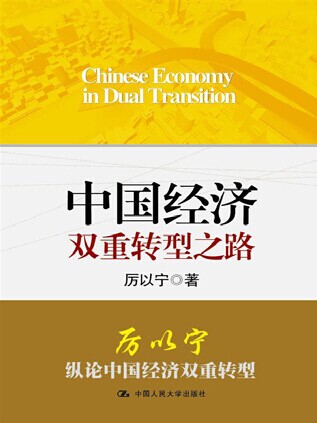China on the way to dual transition

Chinese Economy in Dual Transition
Author:Li Yining
Famed Chinese economist Li Yining's book Chinese Economy in Dual Transition has made a great contribution to developmental economics and offers a new theoretical description of China’s road in the era of reform and opening-up. Before the smoke had even cleared from the Second World War, economists in developed countries had already begun research on how developing countries advanced, giving rise to developmental economics as a discipline.
At the time, the main issues in developmental economics included how to transition from an agricultural society to an industrial one, how to resolve the shortage of capital and technology, and how to assemble various production factors to achieve utility maximization. Economists focused on how some Asian and African countries approached the question of industrialization as they shook off a legacy of colonial dependency. However, few of these countries had adopted a planned economic system, which meant the theories produced by developmental economics were ill equipped for resolving the issues China faced in transition and development.
In his book, Li Yining said what distinguishes China from other developing nations is that it follows a path of what he has termed as a "dual transition". The dual transition refers to both the transformation of development and of the system.
The transition from agricultural to industrial society has traditionally been the focus of developmental economics, but the reforms to China's system are unlike those addressed by economists in the field, who are mainly concerned with the evolution of a capitalist system from a pre-capitalist traditional economy.
Li pointed out that the dual transition of the Chinese economy must emphasize system transformation or development cannot truly be realized. The reason is that under a planned economic system, politics and economy are intertwined, and the planned economic system forms a strong administrative power.
Development is stunted by redundant and inefficient administrations as well as entrenched ideology and conflicting interests. It means that China's reforms still have a long way to go, and it must be comprehensive, coordinated and guided by the best science.
From Li's perspective, the dual transition begins with ownership reform. For newly independent developing countries in Asia and Africa that have not adopted a planned economic system, the key is to realize development transformation. These countries may not be short of micro entities of market economy in the process of transformation or rather it may be much easier to shape micro entities of market economy.
However, no micro entities of market economy exist in the course of transitioning from a planned economic system to a market economic system, and this is why ownership reform is a precondition. For this reason, the book initially concentrates on the significance of ownership reform, proposing land rights verification as well as reforms to the property rights of state-owned enterprises and the forestry property rights system.
Given the systematic nature of reforms, the book offers a comprehensive and systematic explanation of the development of real economy, macro regulation, financial reform, reform of the distribution system, urbanization, independent innovation and product upgrading to create an enhanced understanding among readers.
Li Yiping is from the School of Economics at Renmin University of China.
(Source in Chinese: Guangming Daily)
Translated by Zhang Mengying
